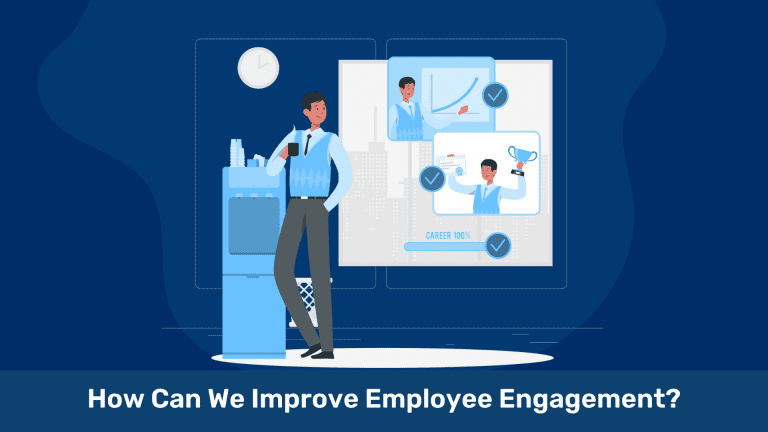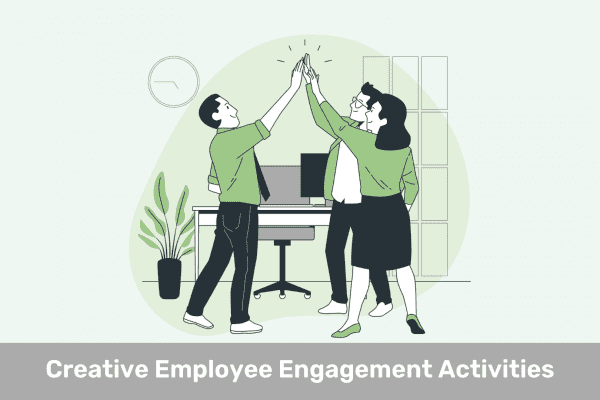Introduction
According to 71% of managers at large companies, employee engagement is an important part of a company’s success.
For many people, work is all about the money. They turn up day after day and do their job so they can get a paycheck. While there’s nothing wrong with this, it’s not really ideal for the company.
For an organization to truly succeed, those working there need to have drive and passion. Employee engagement is all about ensuring people have a desire to work that’s fueled by more than just their salary.
So how can we improve employee engagement? In this guide, we’ll cover everything you need to know.
Why Does Employee Engagement Matter?
A company is nothing without its employees. The amount of thought and effort they put in will directly affect the profitability of a business. As such, knowing how to increase employee engagement will help you grow your company and boost revenue.
There are all kinds of factors that can reduce employee engagement. This often includes things like job market unease, distrust of managers, poor organization, or a lack of cohesion between employees and teams. Fortunately, by understanding how is employee engagement measured and what factors play a part, any organization can improve employee engagement.
How Can We Improve Employee Engagement?
Knowing what drives employee engagement is crucial to business success. There are various strategies you can implement that will help with this, making it easier to achieve your goals. They can do this by improving employee wellness, which relates directly to how people will feel at work.
1. Supply the Right Tools
This is often overlooked, but it’s one of the biggest drivers of employee engagement. You need to make sure all employees have access to whatever tools they need for them to succeed in their roles. You can do this by making sure your company has all the necessary infrastructure in place.
This involves everything that your employees regularly use to complete their work. Large organizations typically have more barriers that prevent employees from doing what they need to. The longer employees have to try to work without the right tools, the more it will negatively impact their engagement.
A common example of this is in companies that use various tools which require different passwords. Having to remember multiple passwords just to get a day of work done isn’t ideal and will frustrate your employees.
You need to think about this more as your business grows. Things will naturally become more complex, so you want to make sure you’re making things as simple as possible for your employees.
2. Give Individual Attention
It’s important to remember that all of your employees are different. As such, they might have different expectations from employers, and you’ll need to consider everyone as an individual to ensure they’re happy at work.
Some companies test employees to analyze their specific tendencies. The results can offer insights into different employees so that you can focus on each individual better.
You might find, for example, that some individuals don’t like speaking in front of large groups, or some prefer to work in teams. You can then make decisions to ensure everyone is working in a way that’s preferable to them.
This testing can also help with new hires. You can determine the type of individual you need for a specific role and test applicants to find someone that fits well.
Managers can look at the results of those on their team to help improve how they communicate with them, leading to better teamwork and motivation. You may not want to go through the process of such testing, in which case you can simply ask your employees about these things. If there’s anything particular that they want (or don’t want), they’ll be able to tell you so you can take action.
3. Provide Training and Coaching
One thing that kills people’s motivation at work is when they feel like they’re going nowhere. If you can create an environment that encourages growth and development, people will be a lot more enthusiastic.
When people can improve their skills and learn new ones while working, they’ll feel a sense of investment in their future. You can offer this by providing various training programs and courses.
This generally isn’t too expensive, and employees with greater skill sets will be able to offer more to the company. You can see this as an investment in your employees as well as your business.
It’s ideal to offer training in skills that will help people do more for your company. Keep things relevant while still giving them something new.
When your employees can be more productive at work, it will make sense to increase their salaries. Your business will benefit from their new skills, and they’ll be happier with a larger paycheck.
4. Listen to Employees
A flaw that’s too common in many companies is that people in positions of authority often think they always know best, which may not be the case. A good leader should know when to listen to those they lead. Pay attention to what your employees are saying and you may be able to make a range of improvements.
A common practice is to get your employees to do annual surveys. They can give opinions on various areas of your business so you can see how they feel. Make these anonymous so that they’ll be honest.
People often feel like there are issues with things like the organization of a company, the resources they have available, or how they can work. Remote work, for example, has become a lot more common in recent years, and if you were to ask your employees, many would say that they’d like to have the option to work remotely.
You may find that employees are asking for things that might not be viable. If this is the case, you can still work to make other improvements. Giving your employees the chance to give their input will also make them feel more valued.
5. Get Social
Another useful way to make employees feel more engaged in their work is to create an environment that encourages connections between colleagues. Healthy relationships between individuals and teams will make people feel closer to those they work with.
This starts with encouraging teamwork in day-to-day tasks, but you can also organize different types of events to build relationships that extend beyond work. Company parties are one of the best opportunities to do this. You can organize fun games and teambuilding activities that get people interacting with one another.
Doing this outside of the work environment can make a huge difference. People will feel more relaxed and they’ll be able to cut loose a bit. Taking away the formality of the workplace will result in more authentic relationships and could help build bonds that otherwise might never exist.
As an employer, you still need to make sure things are handled responsibly. Knowing how to balance life and work will help with this, allowing everyone to have a good time while still maintaining professional relationships without issue.
Many companies now have teams in a range of locations, as well as remote employees. Social activities can be more complicated in such businesses. You can use a platform like Woliba to connect employees from all over the world.
6. Serve Others
Not all companies make use of service projects, but they can be very beneficial. These can help build stronger relationships between employees in a similar way to social events while also giving something back to the local community.
People like to feel that they’re making a difference, and this gives them an opportunity to do that. It can help give people’s lives — and their work — more meaning. It will also make them more proud to work for your company as you’ve shown that you care about the community around you.
There are plenty of things you could organize for this. Some common examples include helping to build homes, donating to orphanages, or raising money for charities.
7. Recognize Proudly and Loudly
It’s well known that rewards and recognition are one of the best ways to improve engagement. Make sure you take the time to highlight employees who are doing things right.
A common example of this is an “employee of the month” system, which you could use to recognize one (or more) employees each month for their hard work. You could even offer rewards such as gift vouchers to standout employees.
Another common choice is to implement rewards for hitting certain targets or goals. This will vary depending on the nature of your business.
Doing this is a great way to show your employees that you appreciate their work. When they feel more noticed, they’ll naturally be more engaged in your company.
Final Thoughts
You may no longer be asking, “How can we improve employee engagement?” in a general sense, but the specifics can be a bit trickier to work out. Ultimately, it will come down to what best suits your company.
Woliba offers a platform that can help enhance the employee experience within your organization. It makes it easier to manage engagement, recognition, well-being, rewards, and data and analytics. Get in touch with our team today to schedule a free demo.





